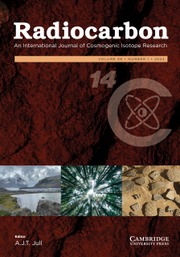Article contents
Direct AMS 14C Analysis of Carbonate
Published online by Cambridge University Press: 15 April 2019
Abstract
We have investigated the possibility of direct accelerator mass spectrometry radiocarbon (AMS 14C) measurement of carbonate samples at ANSTO using the STAR 2 MV tandem accelerator. Each carbonate sample was powdered, mixed with metal powder and pressed into an aluminum cathode for direct carbonate measurement by AMS 14C. Of the three high-purity metal powders (Fe, Nb, and Ag) used in our investigation, Nb was found to be the best metal, which delivered higher carbon beam currents and lower background. Beam currents for targets containing the optimal carbonate mass of 1.5–2.0 mg were ∼8% of those obtained from graphite targets of standard size (>0.5 mg C). Typical measured blank for Carrara marble (IAEA-C1) of ∼40 ka was obtained. Background-corrected 14C values of carbonate targets agreed well with their associated values obtained from high-precision analysis of graphite targets within 2σ uncertainties. Typical precision of this rapid AMS analysis was ∼1% for samples <8 ka. Despite lower precision for carbonate target ages (compared to standard graphite target ages), these ages are useful for palaeobiological applications where a large number of dates are required, such as time-averaging studies.
- Type
- Conference Paper
- Information
- Radiocarbon , Volume 61 , Issue 5: Radiocarbon 2018 Conference Proceedings Trondheim, Norway, June 17–22, 2018 Part 1 of 2 , October 2019 , pp. 1431 - 1440
- Copyright
- © 2019 by the Arizona Board of Regents on behalf of the University of Arizona
Footnotes
Selected Papers from the 23rd International Radiocarbon Conference, Trondheim, Norway, 17–22 June, 2018
References
REFERENCES
- 3
- Cited by


